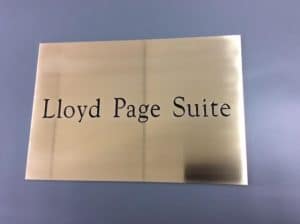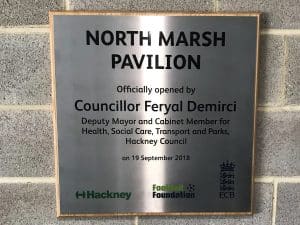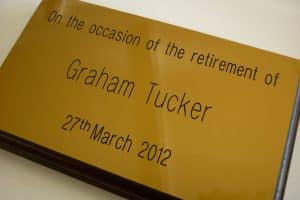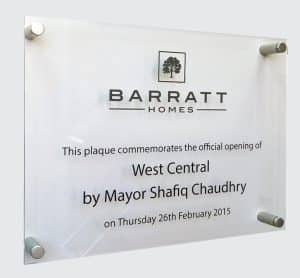Brass

Brass is often a popular choice for engraved plaques and trophies due to its fantastic gold colour. It is an alloy made of copper and zinc, hard-wearing and corrosion-resistant. It is a lovely choice for plaques and is often seen outside Dentists and London Offices polished to a high golden shine. The main disadvantage to brass, however, is that it is does easily tarnish as a result of residue or pollution in the air (oxidisation). Some people like the aged look for bench plaques and memorials but, if you want to achieve the shiny polished look, it does require a great deal more upkeep and maintenance to preserve the metal. This is especially the case for more intricate pieces such as engraved name plates and plaques.
Aluminium

 Aluminium is a silver-white lightweight chemical element which is highly malleable yet durable.
Aluminium is a silver-white lightweight chemical element which is highly malleable yet durable.
Anodised aluminium is a popular choice for plaques due to its long-life span and ability to retain its lustre and metallic sheen for up to 20 years, before it starts to show any signs of wear.
Here at Andrews Signs, we can provide two types of aluminium plaques depending on your commercial engraving requirements: silver anodised, and gold anodised amongst other colours.
A very hardwearing product, silver anodised aluminium is very corrosion resistant meaning that plaques made from this material stay looking as good as new for many years and rarely need cleaning. As such, aluminium is often used as an alternative to stainless steel or brass. Whilst it is true to say aluminium is a considerably weaker and less resilient metal than steel, the positive side to this is that a higher material volume of aluminium can be used whilst retaining its malleable nature, making it a considerably lighter and cheaper option to steel.
Stainless Steel
 Stainless steel plaques are another popular choice of material for opening plaques as they are again very durable and low maintenance. This type of material is also suitable for both indoor and outdoor plaques, making steel an ideal choice for plaques exposed to the elements such as a memorial garden plaques.
Stainless steel plaques are another popular choice of material for opening plaques as they are again very durable and low maintenance. This type of material is also suitable for both indoor and outdoor plaques, making steel an ideal choice for plaques exposed to the elements such as a memorial garden plaques.
Stainless Steel is a low carbon (less than 1.2%), corrosion-resistant metal, making it highly resistant to rust. However, the durability of steel does vary depending on its nickel content meaning that its degree of ductility will vary depending on its type.
A very strong and hardwearing metal, stainless steel can withstand high heats whilst still maintaining its shape and ductility.
At Andrews Signs, we can provide specific material grades for your application.
Plastics
 We can also engrave on gold coloured or silver coloured plastics (also available in a wide variety of colours) or traffolyte to create a beautiful laminate memorial plaque. One of the main advantages of acrylic plastic is its durability and long-lasting properties, which means it is highly resistant to UV and abrasion. Moreover, acrylic laminate is also completely waterproof and requires very little upkeep, making it a fantastic and modern choice for both memorial and commemorative plaques.
We can also engrave on gold coloured or silver coloured plastics (also available in a wide variety of colours) or traffolyte to create a beautiful laminate memorial plaque. One of the main advantages of acrylic plastic is its durability and long-lasting properties, which means it is highly resistant to UV and abrasion. Moreover, acrylic laminate is also completely waterproof and requires very little upkeep, making it a fantastic and modern choice for both memorial and commemorative plaques.
Perspex
 Perspex is a lovely and contemporary choice, ideal for a modern office. A lightweight, durable and weather resistant material, one of the main advantages of Perspex is that it can be manufactured in a range of colours that will not fade or discolour over time. At Andrews Signs, we can create Perspex plaques for all occasions from the most beautiful gloss. This makes this material a perfect, weatherproof option for house name plaques.
Perspex is a lovely and contemporary choice, ideal for a modern office. A lightweight, durable and weather resistant material, one of the main advantages of Perspex is that it can be manufactured in a range of colours that will not fade or discolour over time. At Andrews Signs, we can create Perspex plaques for all occasions from the most beautiful gloss. This makes this material a perfect, weatherproof option for house name plaques.
Our experience engraving team here at Andrews Signs uses all the above materials for a multitude of applications depending on your specification and requirements. For more information on which material would be best for your project, call or email us and we would be happy to help.
01904 400800
